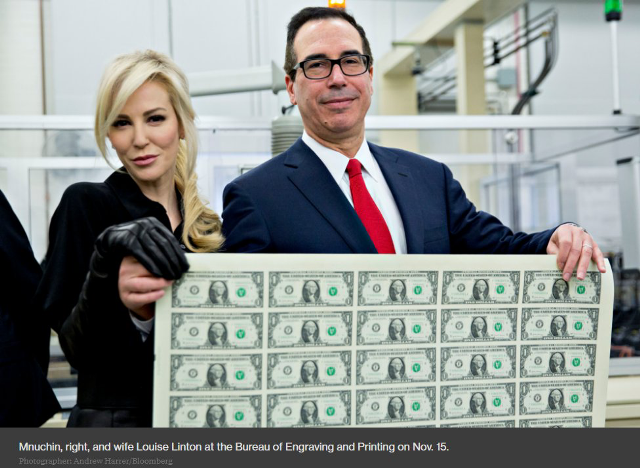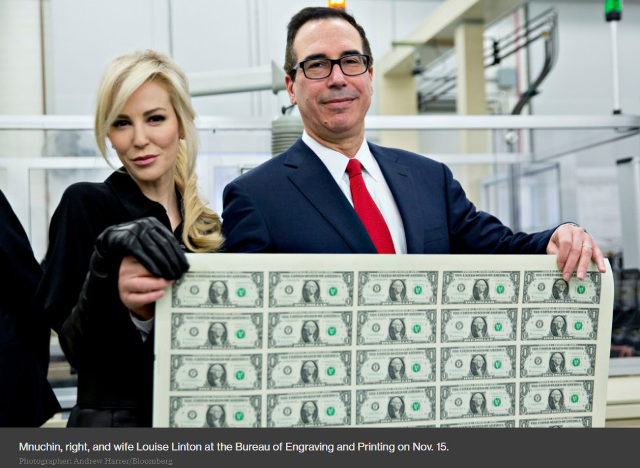File:Mnuchin $.png
Mnuchin_$.png (640 × 468 pixels, file size: 555 KB, MIME type: image/png)
January 2020
GreenPolicy360: As the first month of the new decade comes to a close, we look toward a tumultuous year. In the U.S. a political struggle takes place amid a president's Impeachment trial in the U.S. Congress. The president's administration has rushed to pass an environmental/climate rollback legislation in its first three years in office, approaching one hundred rollbacks and numerous actions to block the environmental/climate work of other nations, public interest groups, non government organizations and activists.
We continue at our work despite the retro policies and 'short-termism' ascendant in these days. The time for political action to make a positive difference in our lives and in protecting and preserving the Commons is even more evident. The call to planet citizens, to valuing the warnings of scientists, and considering the future for coming generations is now, today. The Earth's future is in our hands. It's about ethics, it's about smart decision making. So we keep on keeping on...
Here we share an opinion from a well-known academic, an economist who has a warning and a message about the current U.S. Treasury secretary -- and his put-down of young activist of Greta Thunberg. It is a good time to listen to Paul Krugman.
Why a 17-year-old is a better economist than Steve Mnuchin
By Paul Krugman
Jan. 27, 2020
Reprinted via Creative Commons
I’ve never been a fan of Davos, that annual gathering of the rich and fatuous. One virtue of the pageant of preening and self-importance, however, is that it brings out the worst in some people, leading them to say things that reveal their vileness for all to see.
And so it was for Steven Mnuchin, Donald Trump’s Treasury secretary. First, Mnuchin doubled down on his claim that the 2017 tax cut will pay for itself — just days after his own department confirmed that the budget deficit in 2019 was more than $1 trillion, 75 percent higher than it was in 2016.
Then he sneered at Greta Thunberg, the young climate activist, suggesting that she go study economics before calling for an end to investment in fossil fuels.
Well, unearned arrogance is a Trump administration hallmark — witness Mike Pompeo, the secretary of state, claiming that a respected national security reporter couldn’t find Ukraine on a map. So it may not surprise you to learn that Mnuchin was talking nonsense and that Thunberg almost certainly has it right.
One can only surmise that Mnuchin slept through his undergraduate economics classes. Otherwise he would know that every, and I mean every, major Econ 101 textbook argues for government regulation or taxation of activities that pollute the environment, because otherwise neither producers nor consumers have an incentive to take the damage inflicted by this pollution into account.
And burning fossil fuels is a huge source of environmental damage, not just from climate change but also from local air pollution, which is a major health hazard we don’t do nearly enough to limit.
The International Monetary Fund makes regular estimates of worldwide subsidies to fossil fuels — subsidies that partly take the form of tax breaks and outright cash grants, but mainly involve not holding the industry accountable for the indirect costs it imposes. In 2017 it put these subsidies at $5.2 trillion; yes, that’s trillion with a “T.” For the U.S., the subsidies amounted to $649 billion, which is about $3 million for every worker employed in the extraction of coal, oil and gas. Without these subsidies, it’s hard to imagine that anyone would still be investing in fossil fuels.
But maybe Mnuchin thinks that the I.M.F. should also take some courses in economics — along with the thousands of economists, including every living former Federal Reserve chair, dozens of Nobel laureates, and chief economists from both Democratic and Republican administrations, who signed an open letter calling for taxes on emissions of greenhouse gases.
In short, Greta Thunberg may be only 17, but her views are much closer to the consensus of the economics profession than those of the guy clinging to the zombie idea that tax cuts pay for themselves.
But could the economics consensus be wrong? Yes, but probably because it isn’t hard enough on fossil fuels.
On one side, a number of experts argue that standard models underestimate the risks of climate change, both because they don’t account for its disruptive effects and because they don’t put enough weight on the possibility of total catastrophe.
On the other side, estimates of the cost of reducing emissions tend to understate the role of innovation. Even modest incentives for expanded use of renewable energy led to a spectacular fall in prices over the past decade.
I still often find people — both right-wingers and climate activists — asserting that sharply reducing emissions would require a big decline in G.D.P. Everything we know, however, says that this is wrong, that we can decarbonize while continuing to achieve robust growth.
Given all this, however, why are people like Mnuchin and his boss Trump so adamantly pro-fossil fuel and anti-environmentalist?
Part of the answer, I believe, is that conservatives don’t want to admit that government action is ever justified. Once you concede that the government can do good by protecting the environment, people might start thinking that it can guarantee affordable health care, too.
The bigger issue, however, is sheer greed.
Given the scale of subsidies we give to fossil fuels, the industry as a whole should be regarded as a gigantic grift. It makes money by ripping off everyone else, to some extent through direct taxpayer subsidies, to a greater extent by shunting the true costs of its operations off onto innocent bystanders.
And let’s be clear: Many of those “costs” take the form of sickness and death, because that’s what local air pollution causes. Other costs take the form of “natural” disasters like the burning of Australia, which increasingly bear the signature of climate change.
In a sane world we’d be trying to shut this grift down. But the grifters — which overwhelmingly means corporations and investors, since little of that $3-million-per-worker subsidy trickles down to the workers themselves — have bought themselves a lot of political influence.
And so people like Mnuchin claim not to see anything wrong with industries whose profits depend almost entirely on hurting people. Maybe he should take a course in economics — and another one in ethics.
······························
File history
Click on a date/time to view the file as it appeared at that time.
| Date/Time | Thumbnail | Dimensions | User | Comment | |
|---|---|---|---|---|---|
| current | 19:13, 30 January 2020 |  | 640 × 468 (555 KB) | Siterunner (talk | contribs) |
You cannot overwrite this file.
File usage
The following 3 pages use this file:

